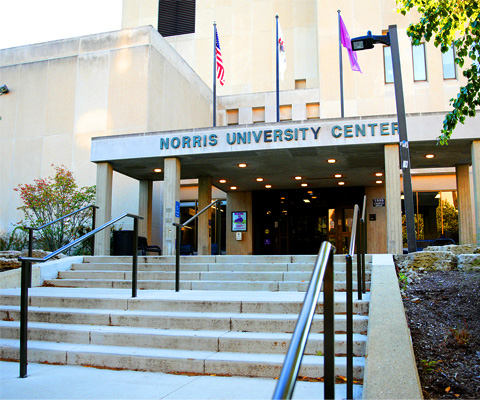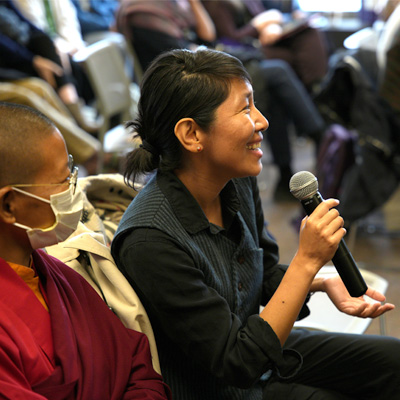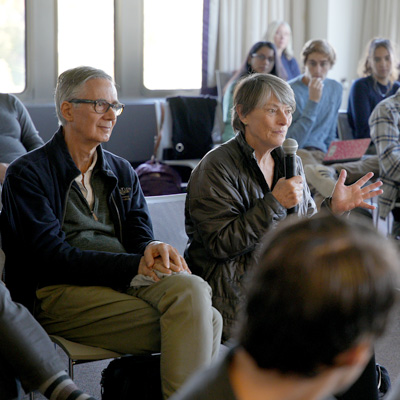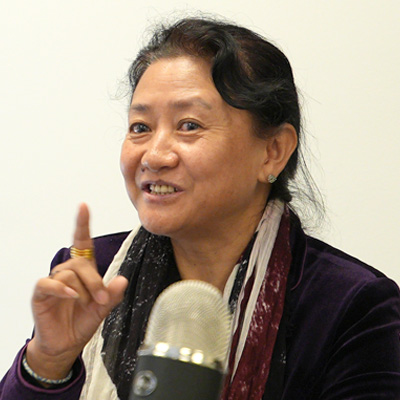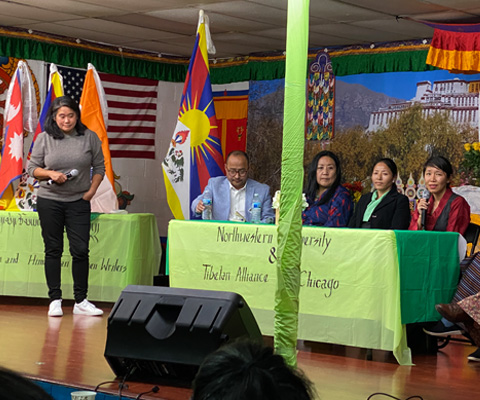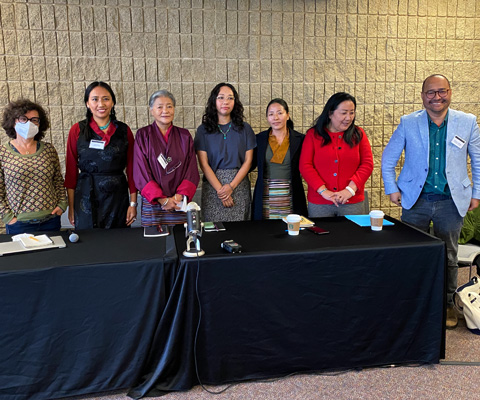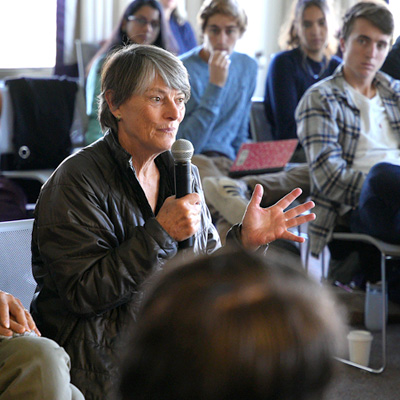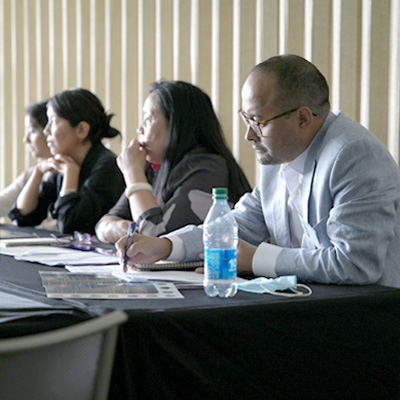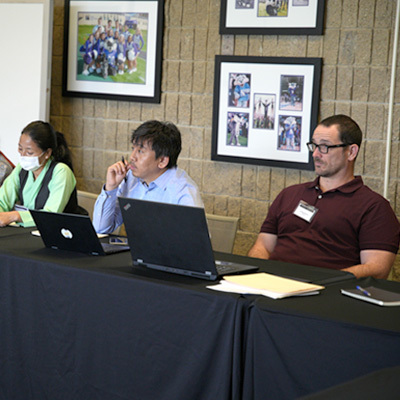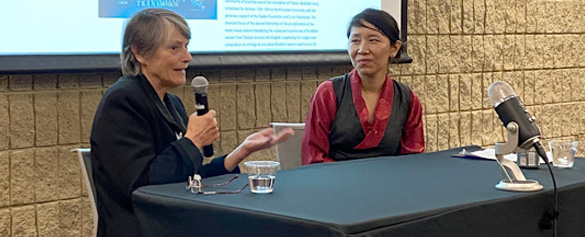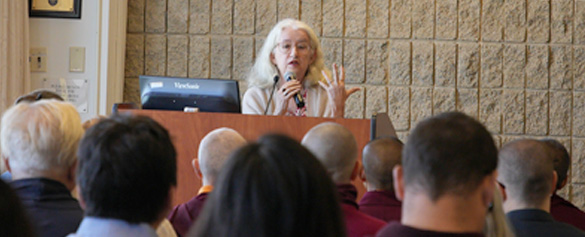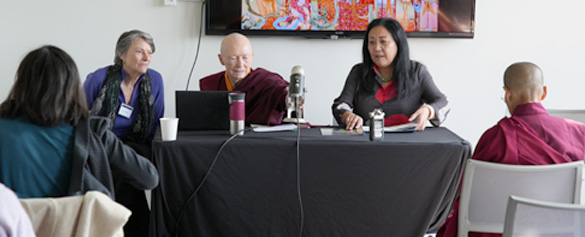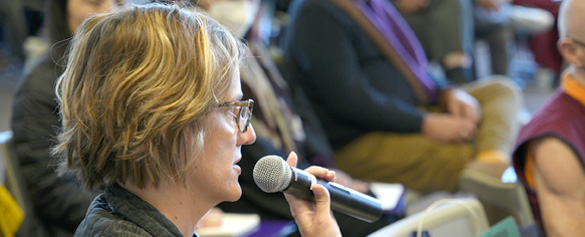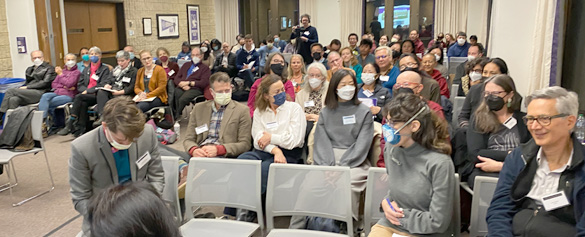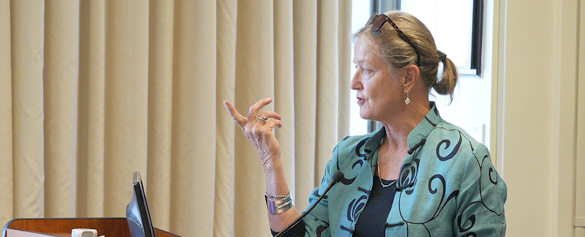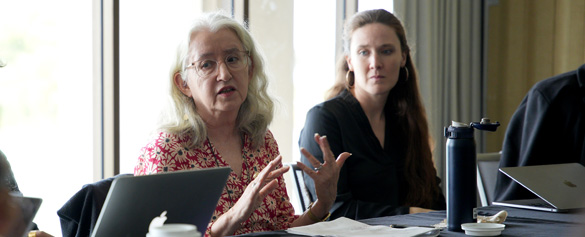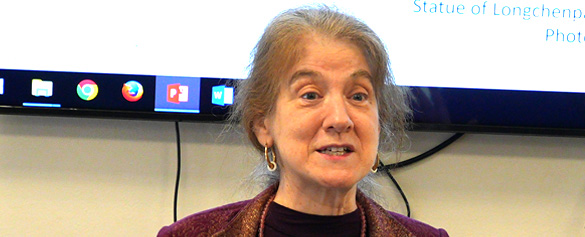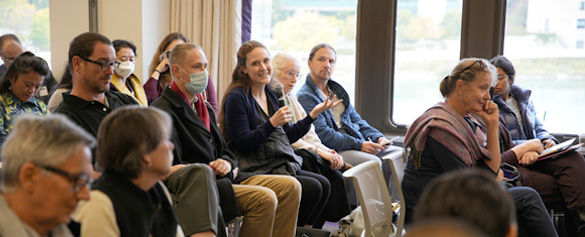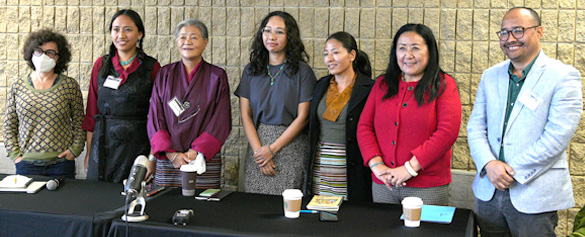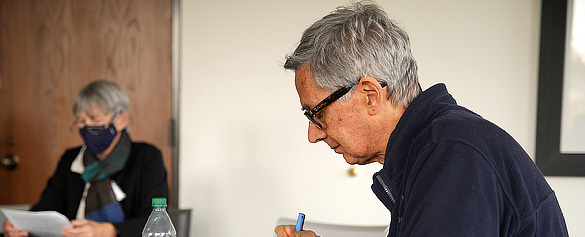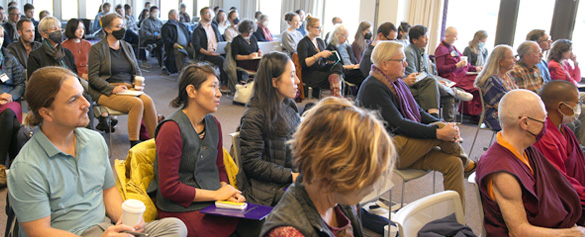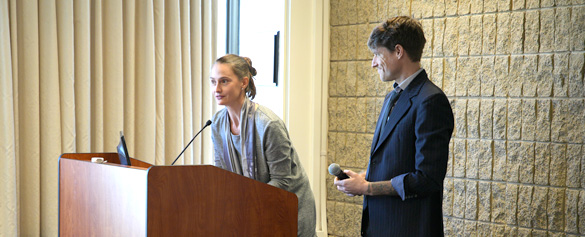NEW UPDATE: Audio recordings only available here
The second Lotsawa Translation Workshop was held at Northwestern University from October 13th through 16th, 2022. The organizers of this event were Sarah Jacoby (Northwestern), Padma ‘Tsho (Southwest Minzu University), Holly Gayley (CU Boulder), Dominique Townsend (Bard), and Joshua Shelton (Northwestern).
This workshop was an opportunity to create a community of practice around the translation of Tibetan Buddhist texts, with the generous support of the Tsadra Foundation, Luce/ACLS, Northwestern’s Department of Religious Studies, and the Department of Asian Languages and Cultures. The thematic focus of this workshop was an exploration of the many issues around translating the voices and experiences of Buddhist women from Tibetan sources into English. Inspired by the largest-ever compilation of writings by and about Buddhist women published in 53 Tibetan volumes in 2017 by Tibetan nuns from Larung Gar called the Ḍākinīs’ Great Dharma Treasury, this Lotsawa workshop focused on a diverse array of Tibetan texts by and about women across time periods, including a wide array of genres and time periods ranging from classical Buddhist texts to modern Tibetan women’s writings.
Theme
Until now the stories, voices, and concerns of Buddhist women in Tibet have been difficult to locate and translate in order to make their perspectives available to contemporary Buddhist communities in the west. A key impetus for the second Lotsawa Translation Workshop comes from the Buddhist nuns at Larung Gar in eastern Tibet who recently published a groundbreaking compilation of 52 volumes of writings by, for, and about Buddhist women in the Tibetan language. Titled the Ḍākinīs’ Great Dharma Treasury (Mkha’ ’gro’i chos mdzod chen mo) and published by the Ārya Tāre Publishing Committee in 2017, this compilation opens up new horizons for the translation of Buddhist texts from Tibetan. It includes a wide swath of genres and texts from across the centuries, including canonical accounts of early Buddhist nuns, the life stories and songs of experience of eminent Buddhist women in Tibet, accounts by female delogs who travel to the realms beyond death, works of Buddhist philosophy by Larung Gar khenmos, supplications to female tantric deities, and advice to nuns and yoginīs practicing meditation in retreat. Inspired by the Ḍākinīs’ Great Dharma Treasury, the theme of this Lotsawa workshop is translating Tibetan texts by and about women across time periods, including a wide array of genres and time periods ranging from classical Buddhist texts to modern Tibetan women’s writings.
Workshop Format
The idea of this workshop is to foster an intensive and immersive experience over four days in order to offer practical support to newer translators and graduate students, incubate fresh approaches to the translation of Buddhist texts from Tibetan, and cultivate a greater sense of community among those engaged in translation. Most of all, we are looking for frank and probing discussion among all the participants—senior and junior, practitioner and scholar—on the many issues at stake in questions around gender and translation. Such discussion will lead to new strategies for translation.
The format for the four-day workshop will combine keynote lectures, panels, and break-out sessions in the mornings and then dedicate the afternoons to working on translations-in-progress in small groups. There will be four Workshop Sessions over the course of the workshop, so that each participant and some presenters will have ample time allocated for discussion and feedback on their translation-in-progress.
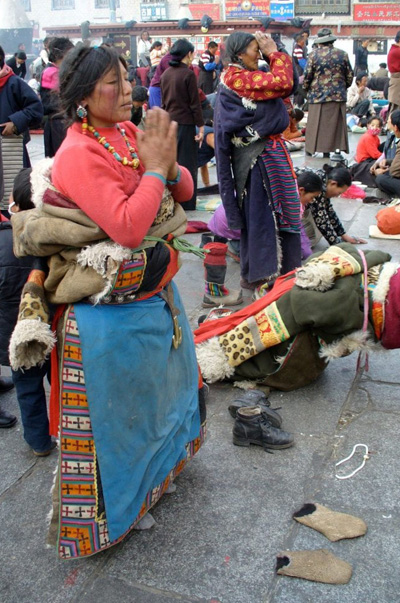
Goals
Some of the guiding questions we seek to explore during the Lotsawa Workshop are the following:
- How should we weigh the relative values of fidelity to the Tibetan source text and our wish to create inclusive Buddhist communities for the future?
- What norms and guidelines can we establish for Tibetan translators to use gender neutral language whenever possible and appropriate?
- Are there themes, genres, and stylistic differences associated with women writers and female voices in Buddhist texts? How can we best render these in English?
The goals of the second Lotsawa Translation Workshop mirror those of the first iteration:
- To connect theory and practice in crafting literary translations of Buddhist texts from Tibetan into English,
- To forge a “community of practice” around translation through experimentation, dialogue, and feedback, and
- To make short Buddhist works of Tibetan literature available to practitioners, undergraduates, and the general public through publishing thematic anthologies of translations.

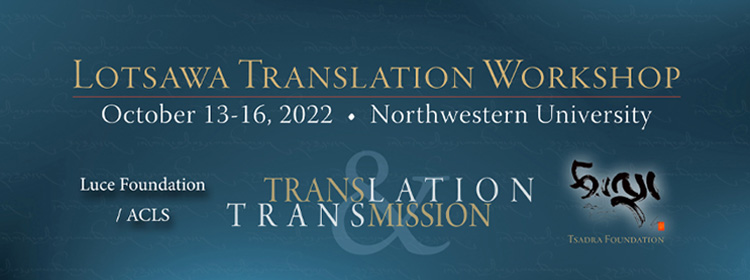
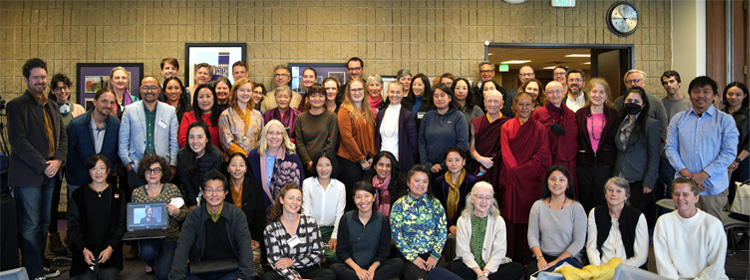

The 2022 Lotsawa Translation Workshop
Thursday, October 13, 2022
WELCOME DAY
6:30 – 7:30 PM Opening Keynote Dialogue: with Sarah Harding & Tenzin Dickie
Friday, October 14, 2022
DAY ONE
9 – 10:30 AM Panel #1: Reflections on Translating Women’s Lives and Teachings in the Tibetan Buddhist Tradition:
Panelists: Karma Lekshe Tsomo, Choela Tenzin Dadon, Ani Choyang, Damchö Diana Finnegan, Janet Gyatso Moderator: Sarah Jacoby
11 – 12:30 PM Breakout Sessions
A1. Women’s Voices in Tibetan Texts:
Panelists: Sarah Harding, Kelsang Lhamo, Karma Lekshe Tsomo
B1. Power Dynamics in Fe/male Literary Dialogues:
Panelists: Holly Gayley, Jue Liang, Sherab Wangmo
C1. Translating Voices from the Margins:
Panelists: Rekjong, Dominique Townsend, Laura Brueck
Saturday, October 15, 2022
DAY TWO
9 – 10:30 AM Keynote lecture: Panelists: Luise von Flotow
Feminist Translation and Translation Studies: in Flux toward the Transnational
11 – 12:30 PM Breakout Sessions
A2. Inclusive/Feminist approaches to Buddhist translation
Panelists: Janet Gyatso, Amy Langenberg, Dawa Lokyitsang
B2. Literary & Liturgical Representations of Women & the Feminine
Panelists: Anne Klein, Khamo Kyid, Padma ‘tsho
C2. Yab Yum Symbolism, Heteronormativity, and Translating Sexual Yoga
Panelists: Kali Nyima Cape, Julie Regan, Willa Baker
Sunday, October 16, 2022
DAY THREE
9 – 10:30 AM Panel #2: Literary Perspectives from Tibetan and Himalayan Women Writers:
Panelists: Kunzang Chodon, Tsering Yangzom Lama, Nyima Tso, Kelsang Lhamo, Tashi Dekyid
Moderator: Francoise Robin and Tashi Dekyid
11 – 12:30 PM Breakout Sessions
A3. Translation Fidelity or Intervention—when should translators sanitize misogyny, explain it, reproduce it, or refuse to translate it?
Panelists: John Canti, Nancy Lin, Elizabeth Callahan
B3: Translating Contemporary Women’s Writing
Panelists: Chime Lama, Dechen Pemba
C3. Buddhist Tropes of Masculinity:
Panelists: Charlene Makley, Kevin Buckelew, Joshua Shelton
12:30 – 2 PM Closing Remarks
Speakers and Facilitators
Search speakers details
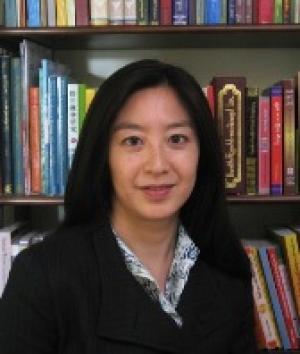
Nancy Lin
84000 and Berkeley
Nancy Lin is a visiting scholar at the University of California, Berkeley, specializing in Buddhist traditions of Tibet and the Himalaya. Her research focuses on courtly Buddhist culture, drawing from poetry and literature, images, objects, and other textual sources of the seventeenth and eighteenth centuries. Her current questions largely cluster around the dynamics between worldliness and renunciation as negotiated in such areas as religion and governance, social distinction and hierarchy, aesthetics and ethos, and wisdom and eloquence. Other interests include rebirth lineages and narratives, Tibetan engagement with Indic Buddhist and literary traditions, and cross-cultural interactions with the Qing court. She has previously held positions at UC Santa Cruz, Dartmouth College, and Vanderbilt University. Currently she is an associate editor for the 84000 translation initiative.
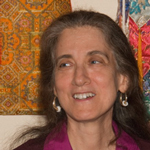
Anne Klein
Rice University
Anne Carolyn Klein/Rigzin Drolma, Professor and Former Chair of Religious Studies, Rice University, and Founding Director of Dawn Mountain, (www.dawnmountain.org). Her six books include Heart Essence of the Vast Expanse: A Story of Transmission; Meeting the Great Bliss Queen, Knowledge & Liberation, and Paths to the Middle as well as Unbounded Wholeness with Geshe Tenzin Wangyal Rinpoche. She has also been a consulting scholar in several Mind and Life programs. Her central thematic interest is the interaction between head and heart as illustrated across a spectrum of Buddhist descriptions of the many varieties of human consciousness.
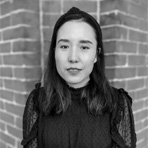
Khamo Kyit
University of Virginia
Khamo Kyit studied Tibetan Buddhism and Literature at the Southwest University for Nationalities and the University of Virginia. In 2021, she received her Ph.D. and authored the dissertation Narrative and Ethics in Tibet: The Ethical Cosmology of Female Revenants. Her research explores the biographies of the seventeenth-century Tibetan delok (revenant) Karma Wangzin as a case study in the analysis of delok genre literature, Buddhist cosmology and ethical beliefs, gender roles, rituals, practices, and the Buddhist societies embedded within these narratives. Her research focuses on studying women in Tibetan Buddhist history and on contemporary Tibetan cultural heritage preservation.

Laura Brueck
Northwestern University
Laura Brueck specializes in modern and contemporary Hindi literature, with a particular focus on literatures of resistance, popular literatures, and translation studies. Her books include “Writing Resistance: The Rhetorical Imagination of Hindi Dalit Literature” (Columbia University Press, 2014/ Primus, 2017) and a collection of Hindi short stories in English translation titled “Unclaimed Terrain: Stories by Ajay Navaria” (Navayana, 2013/ Giramondo, 2015). She has edited several scholarly anthologies, most recently in the areas of vernacular literatures in South Asia and Indian sound studies. She is currently working on a monograph on Indian detective novels and co-editing the forthcoming Routledge Companion to Postcolonial and Decolonial Literature. She is the Chair of the Department of Asian Languages and Cultures and the co-founder and co-director of the Race, Caste, and Colorism Project at Northwestern.
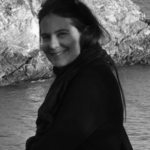
Julie Regan
La Salle University
Julie Regan is an assistant professor of Asian religions at La Salle University, where she teaches classes including Buddhism in Asia and Beyond, Tibetan Buddhism, and Yoga, Dharma and Devotion. Her scholarship combines a background in literature and literary arts (Brown University, B.A. and M.F.A.), study with traditional Tibetan teachers, and training in Buddhist studies (Harvard University, Ph.D.) in order to explore the connections between literary and bodily practices of liberation. Her research takes an interdisciplinary approach to reading a variety of texts, performances and rituals, from early Sanskrit court poetry to contemporary Tibetan works of art, literature, and protest. She is currently completing a book, “The Poetic Path to Awakening: Reading the Buddhist Literary Text as a Form of Practice,” based on her translation of the works of Asvaghosa from Sanskrit and Tibetan.
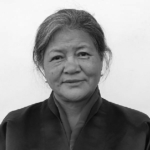
Kunzang Choden
Ogyen Choling Foundation
Kunzang Choden was born in Bumthang, central Bhutan in 1952, a time when there were no educational opportunities for girls, so she did her entire education in India in English medium schools. Later, she studied Psychology and Sociology in colleges in India and the US. She began her professional career as a teacher and worked for a while with the UN. Her first book, Folktales of Bhutan, was published in 1994. Since then she continue to write on a variety of topics, but her main interest is still oral and folk traditions, especially pertaining to women. Her notable publications include the novel Circle of Karma (2005) and collection of short stories, Tales in Colour and Other Stories (2009). Today, she writes mainly for children and young adults.
For over twenty years, Kunzang Choden has been involved and fully committed to renovating and revitalizing her ancestral home, Ogyen Choling, which is an important religious and historical site in Bumthang. Since the 1990s, she has dedicated her energy and resources to setting up a museum that showcases the life of a landed feudal family during the 19th century. She is currently the executive director of the Civil Society Organization, Ogyen Choling Foundation, and the curator of the museum under the Foundation.
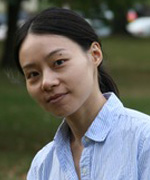
Jue Liang
Denison University
Jue Liang is an Assistant Professor in the Religion Department of Denison University. She is a scholar of Tibetan Buddhist literature, history, and culture. She received her Ph.D. in Religious Studies from the University of Virginia. Her dissertation, Conceiving the Mother of Tibet: The Life, Lives, and Afterlife of the Buddhist Saint Yeshe Tsogyel, examines the literary tradition surrounding the matron saint of Tibet, Yeshe Tsogyel, in the fourteenth and fifteenth centuries. It also presents the blossoming of this literary tradition in tandem with the efforts to trace their religious pedigree and define what counts as authentic Buddhism by Nyingma Tibetan Buddhists. She is currently working on a second project titled Who Is a Buddhist Feminist: Theorizing Gender and Religion in Contemporary Tibet. It is a study on the history, discourse, and social effects of the khenmo program, a gender-equality initiative that has been taking place at Tibetan Buddhist institutions in China for the past three decades. Jue is also an active participant in discussions on Buddhism in both academic and public forums.
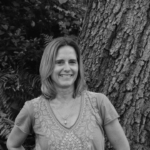
Amy Paris Langenberg
Eckerd College
Amy Paris Langenberg is Associate Professor of Religious Studies at Eckerd College. She is a specialist in classical South Asian Buddhism with a focus on female monasticism, gender, sexuality, and the body. She also conducts ethnographic research on contemporary Buddhist feminisms, contemporary female Buddhist monasticism, and, more recently, sexual abuse in American Buddhism. She is the author of Birth in Buddhism: The Suffering Fetus and Female Freedom (Routledge, 2017) and is currently collaborating with Dr. Ann Gleig on a study of sexual abuse in American Buddhism, titled Abuse, Sex, and the Sangha, which will be published with Yale University Press.

Nicole Willock
Old Dominion University
Nicole Willock (PhD Indiana University in Tibetan Studies and Religious Studies, 2011) is an assistant professor at Old Dominion University in Norfolk, Va. She is 2017 Research Fellow, The Robert H. N. Ho Family Foundation Program in Buddhist Studies, administered by the American Council of Learned Societies for her book project: Lineages of the Literary: Tibetan Buddhists Making Modern China. She is currently polishing up A Tibetan-English Primer for Poetics (Snyan ngag leg deb bod yin shan sbyar), which is co-authored by Gendün Rabsal. She also co-translated “Zhangtön Tenpa Gyatso’s Advice a Jeweled Rosary” with Gendün Rabsal, which will appear in A Gathering of Brilliant Moons: Practice Advice from the Rimé Masters of Tibet, edited by Holly Gayley and Joshua Schapiro (Boston: Wisdom Publications, expected in 2017).
Karma Lekshe Tsomo
University of California, San Diego
Karma Lekshe Tsomo is a professor of Theology and Religious Studies at the University of San Diego. She received novice precepts from the Sixteenth Gyalwang Karmapa in France in 1977 and full ordination in Korea in 1982. She studied Buddhism in Dharamsala for fifteen years and received a doctorate in Comparative Asian Philosophy from the University of Hawai`i in 2000. She is a founder and past president of Sakyadhita International Association of Buddhist Women (www.sakyadhita.org) and director of Jamyang Foundation (www.jamyang.org), an innovative education project for women in developing countries. She has edited a number of books on women in Buddhism.

Damchö Diana Finnegan
Comunidad Dharmadatta
Damchö Diana Finnegan holds a PhD from University of Wisconsin-Madison with a dissertation on gender and ethics in narratives about early Buddhist nuns. Her translation work centers on Buddhist narrative in Sanskrit and Tibetan, while ranging widely across other genres. Damchö co-founded and heads Dharmadatta Community (Comunidad Dharmadatta), a Spanish-speaking Dharma community with a presence across Latin America, and an online study institute serving hundreds of Latinx students each semester. In teaching on the life stories of Buddhist women for this community, she has been exploring the territory where translation and storytelling meet. For over a decade, she has lived in community with a small group of other nuns, first in India, then in Mexico and now in rural Virginia. She is currently working on a book on the sevenfold method for generating bodhicitta, asking how it shifts when women’s experiences are placed at the center of the practice.
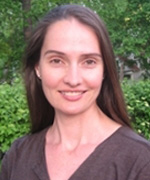
Sarah Jacoby
Northwestern University
Sarah Jacoby, Ph.D., is an associate professor in the Religious Studies Department at Northwestern University. She is also the co-chair of the Tibetan and Himalayan Religions Group at the American Academy of Religion. Sarah Jacoby studies Tibetan Buddhist doctrine and ritual in practice, gender and sexuality, Tibetan literature, religious auto/biography, Buddhist revelation (gter ma), and the history of eastern Tibet. She is the author of Love and Liberation: Autobiographical Writings of the Tibetan Buddhist Visionary Sera Khandro (Columbia University Press, 2014), co-author of Buddhism: Introducing the Buddhist Experience (Oxford University Press, 2014), and co-editor of Buddhism Beyond the Monastery: Tantric Practices and their Performers in Tibet and the Himalayas (Brill, 2009).
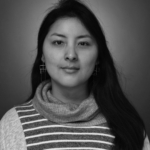
Chime Lama
Chime Lama (འཆི་མེད་ཆོས་སྒྲོན།) is a Tibetan American writer, translator and multi-genre artist based in New York. She holds an MA in Divinity from the University of Chicago and an MFA in Creative Writing from the City University of New York: Brooklyn College. She serves as the Poetry Editor of Yeshe: A Journal of Tibetan Literature, Arts and Humanities. Her work won the 2020 Himan Brown Award in Creative Writing, the 2021 Bonnie Perlsweig Mintz Award in Editing, and has been featured in Exposition Review, The Margins, Stonecoast Review, Street Cake, Volume Poetry, Tribes Magazine, and Tricycle, among others. Her poetry has been translated into Portuguese, and appears in Cadernos de Literatura em Tradução, n. 24 (Notebooks of Literature in Translation), edited by Shelly Bhoil, and translated by Thiago Ponce de Moraes.
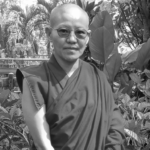
Choela Tenzin Dadon
Choela Tenzin Dadon was born in Bhutan and became a nun in 1993 in Dharamsala, India after completing high school in Bhutan. She later received her śrāmaṇerikā ordination from His Holiness the 14th Dalai Lama in Dharamsala in 1999.
Tsunma Tenzin left her home country to pursue a systematic monastic education which was, and to a large extent still is, not available to nuns in Bhutan. Tsunma spent 13 years (1993-2006) at Jamyang Choling Institute for Buddhist Dialectics in Dharamsala, India studying Buddhist philosophy and Tibetan language and literature.
Tsunma Tenzin holds MA degrees in Tibetan Buddhist Studies from Delhi University (2009) and from the International Buddhist College in Thailand (2016), broadening her scope to all Buddhist traditions. Tsunma completed her Doctor of Philosophy degree in Gender and Religion at the University of Malaya, Kuala Lumpur, Malaysia (2017), focusing her anthropological thesis on nuns in Bhutan with the aim of improving the status and living conditions of nuns in her native country. Tsunma is the first Himalayan Buddhist nun to obtain a Ph.D.
Tsunma has taught the Diploma course in Buddhist Studies of the Buddhist and Pali University (BAPU) under the Buddhist Missionary Society of Malaysia. She also conducts Tibetan language courses in Malaysia for the laity. Currently Tsunma is working as a Director of Education in Vajrayana Buddhist Council of Malaysia.
Tsunma’s contribution to Buddhist women in Vajrayana Buddhism was recognized by the Association for the Promotion of Status of Women in Thailand who honoured her with the Outstanding Women in Buddhism Award in Bangkok, Thailand on 2 March 2012.
Tsunma Dr. Tenzin Dadon has co-authored two books with Tsunma Dr. Karma Choedron. The one, Two Gurus One Message (2019), coincided with the 550th birth anniversary of Guru Nanak Dev Ji. The other, I Can Be Enlightened Too, is pending publication.
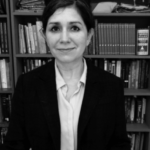
Kali Nyima Cape
University of Virginia
Kali Nyima Cape is a Ph.D. Candidate in Buddhist Studies at the University of Virginia, specializing in Tibet, Buddhism outside the monastery, and Women, Gender and Sexuality in Buddhism. She is a Tsadra Foundation dissertation fellow, a Fulbright-Hays scholar and her research has also been funded by the Ford Foundation. Her current research focuses on women and consorts in esoteric Tibetan Great Perfection (rdzogs chen) scriptures called The Heart of the Ḍākinī (mkha’ ‘gro snying thig), as well as focusing on trauma and resilience in Buddhist philosophy. She is an Assistant Professor of Buddhist Studies & Applied Religion at Georgia State University.
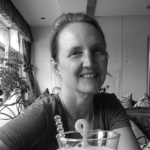
Charlene Makley
Reed College
Charlene Makley is Professor of Anthropology at Reed College in Portland, Oregon. Her work has explored the history and cultural politics of state-building, state-led development and Buddhist revival among Tibetans in China’s restive frontier zone (SE Qinghai and SW Gansu provinces) since 1992. Her analyses draw especially on methodologies from linguistic and economic anthropology, gender and media studies, and studies of religion and ritual that unpack the semiotic and pragmatic specificities of intersubjective communication, exchange, personhood and value. Her first book, The Violence of Liberation: Gender and Tibetan Buddhist Revival in Post-Mao China, was published by UCalif Press in 2007. Her second book, The Battle for Fortune: State-Led Development, Personhood and Power among Tibetans in China, published in 2018 by Cornell University Press and the Weatherhead East Asia Institute at Columbia University, is an ethnography of state-local relations in the historically Tibetan region of Rebgong (SE Qinghai province) in the wake of China’s Great Open the West campaign and during the 2008 military crackdown on Tibetan unrest. Her most recent project is collaborative oral historical research on the tenth Panchen Lama’s post-prison tours of Amdo in the 1980s. As part of that work, she is a member of the Amdo Translation Collective (མདོ་སྨད་ལོ་ཙྰ་མཐུན་ཚོགས), an international group of Tibet scholars who work collaboratively on translating texts and other media from early post-Mao and contemporary Amdo into English, in order to make them accessible to larger publics.
John Canti
Padmakara Translation Group; 84000
In 1970, while studying medicine at Cambridge, John Canti first met his Buddhist teachers, and started to practice under their guidance. After hospital work in London and Cambridge, he moved in the late seventies to eastern Nepal to establish tuberculosis programs in two remote hill districts. Beginning in 1980, he underwent two three-year retreats in the Dordogne, France. Emerging from retreat at the end of the 80s, he helped found the Padmakara Translation Group, of which he is now president, and remains an active translator. From 2001 to 2014 he was a Fellow of the Tsadra Foundation. He is editorial director of 84000 and serves on the working committee as chair of the editorial section. He is based mainly in France but has spent long periods in Nepal and India. As well as his 84000 work, John is working on Mipham’s commentary on the Ratnagotravibhāgottaratantraśāstra.
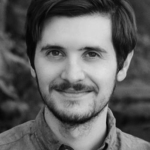
Kevin Buckelew
Northwestern University
Kevin Buckelew is Assistant Professor of Religious Studies at Northwestern University, and specializes in the study of Chinese Buddhism. His book in progress focuses on the Chan Buddhist tradition in Song-dynasty China, and asks how Chan Buddhists understood Chan mastery to entail not just skill in meditation (as the word chan literally implies), but the full realization of buddhahood. Thematically, his research explores how religious identities take shape and assume social authority, how materiality and embodiment figure into Buddhist soteriology, and how Buddhists have grappled with the problem of human agency. He has performed research in China, Taiwan, and Japan with the support of grants from the Fulbright program and the Bukkyo Dendo Kyokai.
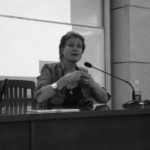
Luise von Flotow
University of Ottawa
Luise von Flotow has taught Translation Studies at the University of Ottawa in Canada since 1996. Her main research interests have focused on feminist and gender issues in translation, translation as cultural diplomacy, and audio-visual translation. Publications include articles and books authored and edited in these areas: The Routledge Handbook on Translation, Feminism and Gender, eds. Luise von Flotow and Hala Kamal, 2020; Translating Women, Different Voices and New Horizons, eds. Luise von Flotow and Farzaneh Farhazad, Routledge 2017; Translation Effects: The Making of Contemporary Canadian Culture and Translation, ed. with Kathy Mezei and Sherry Simon, McGill Queens UP 2014; Translating Women, ed. University of Ottawa Press 2011; Translating Canada. Charting the Institutions and Influences of Cultural Transfer. Canadian Writing in German/y. eds. Luise von Flotow and Reingard Nischik, University of Ottawa Press 2007; Translation and Gender. Translation in the ‘Era of Feminism’ St. Jerome Publishing and University of Ottawa Press 1997.
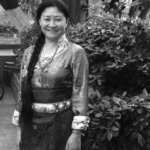
Padma Tsho
Southwest University for Nationalities
Padma Tsho (Baimacuo) is Professor in the Philosophy Department of Southwest University for Nationalities in Chengdu, China. She holds a Ph.D. from Sichuan University in Chengdu and M.A. from Central Nationalities University in Beijing. She was an Instructor at Front Range Community in 2016-2017. She has published about 50 articles in several languages and two books. Her areas of research and teaching include Tibetan Buddhism, ritual, and culture, as well as the education of Buddhist nuns in Tibetan areas. Her articles have appeared in edited volumes, such as Eminent Buddhist Women, edited by Karma Lekshe Tsomo; Voices from Larung Gar, edited by Holly Gayley; and numerous journals, including Religions,Contemporary Buddhism, China Tibetology, Journal of Ethnology, Sichuan Tibetan Studies, and Asian Highlands Perspective. In the last decade, Professor Padma ‘tsho has spent time at several North American universities as a Visiting Research Scholar, including Harvard, Columbia, University of Virginia, and CU Boulder.
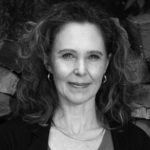
Willa Baker
Willa Blythe Baker, PhD, is a teacher, author and translator. Her books include Essence of Ambrosia: A Guide to Buddhist Contemplations (Library of Tibetan Works and Archives 2005, a translation of Taranatha’s Lamrim), The Arts of Contemplative Care: Pioneering Voices in Buddhist Chaplaincy and Pastoral Work (Wisdom Publications 2012, with Cheryl Giles, PsyD), and The Wakeful Body: Somatic Mindfulness as a Path to Freedom (Shambhala Publications 2021). Her articles and translations have appeared in the Journal of the International Association of Buddhist Studies, The Tibet Journal, Buddhadharma Magazine, Lion’s Roar, Tricycle Magazine and several liturgical collections. She is the founder of Natural Dharma Fellowship and its retreat center Wonderwell Mountain Refuge. She is currently working on the translation of a memoir by Jigme Lingpa.
Sarah Harding
Tsadra Foundation Fellow; Naropa University
Sarah Harding has been a Buddhist practitioner since 1974 and has been teaching and translating since completing a three-year retreat in 1980 under the guidance of Kyabje Kalu Rinpoche. Her publications include Creation and Completion, The Life and Revelations of Pema Lingpa, Treasury of Knowledge: Esoteric Instructions, Machig’s Complete Explanation, and Niguma, Lady of Illusion. She is an associate professor at Naropa University in Boulder, Colorado, where she has been teaching since 1992, and has been a fellow of the Tsadra Foundation since 2000. Currently she is working on translating the zhi byed and gcod sections of the gdams ngag rin po che’i mdzod.
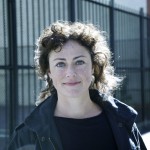
Dominique Townsend
Bard College, NY
Dominique Townsend is Assistant Professor of Buddhist Studies at Bard College. She received her BA from Barnard College, MTS from Harvard Divinity School and PhD from Columbia University in the Department of East Asian Languages and Cultures. Her research is stimulated by productive tensions in Buddhist cultures, such as the relationship between the cultivation of the arts and renunciation. Dominique’s primary interests include Buddhist poetics, pedagogy, and institutionalized charisma. Her current project, based on her dissertation research, focuses on aesthetics and cosmopolitanism in Tibetan Buddhism, with a particular focus on the history of Mindrölling Monastery.
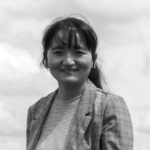
Sherab Wangmo
Northwestern University
Sherab Wangmo is a Ph.D. candidate in the Religious Studies department at Northwestern University. Her research focuses on gender and sexuality in Bon and Tibetan Buddhism. Her dissertation explores the consort relationship, self-(re)presentation, and agency in (auto)biographies of Sang-Ngak Lingpa (1864-1934?) and Khandro Dechen Wangmo (1868-1935?), two eminent Bonpo treasure revealers in eastern Tibet. Before coming to Northwestern, she received an MA from the University of Colorado Boulder and a BA from the Minzu University of China in Beijing. Her advisor is Sarah Jacoby.
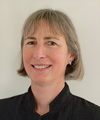
Elizabeth Callahan
Tsadra Foundation Fellow
Elizabeth has been engaged in contemplative training and Tibetan Buddhist studies for more than 35 years. A Tsadra Fellow since 2002, she has engaged in both written translation and oral interpretation including working closely with Khenpo Tsültrim Gyamtso, as well as completing two three-year retreats at Kagyu Thubten Chöling, New York. Elizabeth specializes in translating texts related to mahāmudrā and esoteric tantric commentaries and has published the Ninth Karmapa’s Mahāmudrā: Ocean of Definitive Meaning, Jamgön Kongtrul’s The Treasury of Knowledge Book 6, Part 3, and the third Karmapa Rangjung Dorje’s Profound Inner Principles (with Kongtrul’s commentary). She is currently working on Dakpo Tashi Namgyal’s Moonbeams of Mahāmudrā (Phyag chen zla ba’i ‘od zer) and the Ninth Karmapa’s Dispelling the Darkness of Ignorance (Ma rig mun sel). Elizabeth is also the Director of Advanced Study Scholarships at Tsadra Foundation and is the executive director of Marpa Foundation.
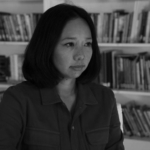
Tsering Yangzom Lama
Tsering Yangzom Lama is a Tibetan writer. She was born and raised in Nepal, and has since lived in Canada and the United States. Tsering earned her MFA in writing from Columbia University and a BA in Creative Writing and International Relations from the University of British Columbia. Her debut novel WE MEASURE THE EARTH WITH OUR BODIES is out with Bloomsbury USA and McClelland & Stewart in Canada, and will be translated into Dutch, French, and Italian.
Tsering’s writing has appeared in The Globe and Mail, The Malahat Review, Grain, Kenyon Review, Vela, LaLit, and Himal SouthAsian, as well as the anthologies Old Demons New Deities: 21 Short Stories from Tibet; House of Snow: An Anthology of the Greatest Writing About Nepal; and Brave New Play Rites. She is also a co-founder of LhakarDiaries, a leading English-language blog among Tibetan youth in exile. A recipient of grants from the Canada Council for the Arts, the Barbara Deming Memorial Fund, and Tin House, Tsering has held residencies at the Banff Center for Arts and Creativity, Hedgebrook, Willapa Bay AiR, Vermont Studio Center, Virginia Center for the Creative Arts, Lillian E. Smith Center, Art Omi, Catwalk Institute, WildAcres, and Playa Summerlake.
Holly Gayley
University of Colorado, Boulder
Holly Gayley is Assistant Professor of Buddhist Studies at the University of Colorado, Boulder. Her research focuses on the revitalization of Buddhism in the Tibetan region of Golok since the 1980s. She completed her Masters in Buddhist Studies at Naropa University in 2000 and PhD at Harvard University in Tibetan and Himalayan Studies in 2009. Currently, she is finalizing a manuscript on the life and love letters of the contemporary female tertön, Khandro Tāre Lhamo, and her consort Namtrul Rinpoche and translating texts of advice to the laity by Khenpo Jigme Phuntsok and his successors at Larung Buddhist Academy in Serta. In 2013, Holly co-organized the conference, “Translating Buddhist Luminaries,” which brought translators and scholars into a conversation about the art of translation in relation to pithy texts of advice by nineteenth century ecumenical masters such as Patrul Rinpoche, Ju Mipham, and Jamgön Kongtrul. The translations will appear in an edited volume with Wisdom Publications.
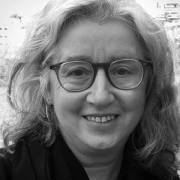
Janet Gyatso
Harvard University
Janet Gyatso (BA, MA, PhD, University of California at Berkeley) is a specialist in Buddhist studies with concentration on Tibetan and South Asian cultural and intellectual history. Her books include Apparitions of the Self: The Secret Autobiographies of a Tibetan Visionary; In the Mirror of Memory: Reflections on Mindfulness and Remembrance in Indian and Tibetan Buddhism; and Women of Tibet. She has recently completed a new book, Being Human in a Buddhist World: An Intellectual History of Medicine in Early Modern Tibet, which focuses upon alternative early modernities and the conjunctions and disjunctions between religious and scientific epistemologies in Tibetan medicine in the sixteenth–eighteenth centuries.

Françoise Robin
French National Institute for Oriental Languages and Civilisations
Professor Françoise Robin has been studying and translating contemporary Tibetan literature (mainly fiction and poetry) since the late 1990s, examining its relevance for our understanding of today’s Tibetan society. Over the years, she has regularly travelled to Tibet and has become familiar with writers, poets and later, filmmakers, as well as their works. Most of her research combines social observation with literary and film creation, and have recently focused more on women’s writings, the rise of Tibetan feminism as well the relationship between literature and women’s empowerment in the Tibetan context. She has been teaching Tibetan language and literature at Inalco (French National Institute for Oriental Languages and Civilisations), France, for the last twenty years. She regularly publishes French translation of Tibetan works. Tempête rouge, her translation of Tsering Dondrup’s The red wind howls (Rlung dmar ‘ur ’ur), was awarded the literary prize “Montluc Résistance et Liberté” in 2020.

Joshua Shelton
Northwestern University
Joshua Shelton is a doctoral candidate in Buddhist Studies at Northwestern University. His dissertation research considers the gendered dimensions of tantric ritual, narrative, and ideology in Tibetan Vajrayāna Buddhism, with particular interest in the role of masculinity in tantric Buddhist subject formation. His dissertation focuses on the life and writings of Do Khyentsé Yeshé Dorjé, the deer-hunting, alcohol-drinking, gun-wielding tantric master from the Golok region of eastern Tibet. He holds an M.A. in Buddhist Studies from the University of Colorado Boulder, an M.Div. in Indo-Tibetan Buddhism from Naropa University, and a B.A. in Religious Studies from Georgetown. He is advised by Sarah Jacoby.
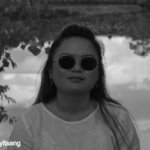
Dawa Lokyitsang
University of Colorado
Dawa T. Lokyitsang is a PhD candidate in anthropology at the University of Colorado, Boulder. Her work looks at the development of sovereignty by Tibetans in exile through the making of schools in response to Chinese colonialism and for securing Tibetan continuity and futurity. As such, her scholarship sits at the intersection of empire, colonialism, and nationalism. Lokyitsang has also presented and published on topics involving belonging, colonialism and imperialism, and decolonization and indignity through the frameworks of Tibet and China. Most of her work can be found on Lkhakar Diaries.
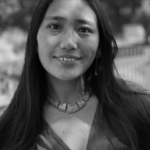
Tashi Dekyid Monet
University of Virginia
Tashi Dekyid Monet (མོ་ངེ་བཀྲ་ཤིས་བདེ་སྐྱིད།) is a PhD candidate in the School of Education and Human Development at University of Virginia. She is currently working on a dissertation project titled “Knowing with the Indigenous Land: Reimagining Knowledge, Place, and Community in Tibetan Education”. She grew up in Minyak Kham and completed a BA in Tibetan language and Literature from Minzu University of China in 2011. She was previously a translation contributor to the anthology of the translated World Literature (འཛམ་གླིང་རྩོམ་རིག) that has been published annually in China since 2017. She is a co-organizer of the Tibetan Women Writing Symposium (April 8-10, 2022) at University of Virginia.
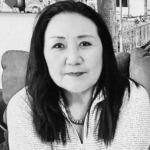
Kelsang Lhamo
Buddhist Digital Resource Center (BDRC)
Kelsang Lhamo was born 1973 in Lhokha area, south of Lhasa. She received teachings from Sheldrak Khen Rinpoche and Dungkar Losang Trinlé, mainly on Tibetan medicine, but also on the Five Minor Sciences, mostly Nyingma teachings. To pursue further studies, she left for India in 1989. She received novice vows from His Holiness The 14th Dalai Lama, and for a period of ten years studied and received Geluk teachings, mainly from Geshe Drubthob Rinpoche and many other masters. At the same time she studied Hindi language and the Vedas in Varanasi.
Kelsang moved to USA in 1999 and for a period of several years taught Tibetan and Buddhist philosophy to the son of Sogyal Rinpoche. During this time she also translated Sogyal Rinpoche’s The Tibetan Book of Living and Dying into Tibetan language with Ringu Tulku. In 2003, with the kind support of Alak Zenkar Rinpoche and Tashi Tsering Josayma, Kelsang joined the Buddhist Digital Resource Center (BDRC), formerly the Tibetan Buddhist Resource Center (TBRC). Under the guidance of Gene Smith, the founder of BDRC, she continued her study of Tibetan literature. Kelsang has taught Tibetan language and literature to many students. At present she is working as Librarian and cataloger at BDRC.
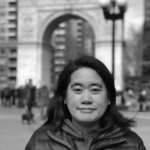
Dechen Pemba
Dechen Pemba is editor of the translations website High Peaks Pure Earth (https://highpeakspureearth.com). Dechen was born in the UK and graduated from University College London with a degree in English and German Literature. After several years working as a lobbyist and campaigner on Tibet in Berlin, Germany, she lived in Beijing from 2006-2008 learning Chinese at the Central University for Nationalities in Beijing and teaching English. After completing a Masters in Chinese Studies from the School of Oriental and African Studies, Dechen has been involved in several long term projects such as Filming for Tibet, Tibet Film Festival, Tibetan Writers Group and smartvote Tibet. Dechen also serves as a researcher and consultant on Tibet-related issues.
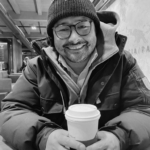
Dhondup T. Rekjong
Northwestern University
Dhondup T. Rekjong is a doctoral student in Buddhist Studies with a strong background in Tibetan history, language, and literature. He was born in Rebkong in the Amdo region of Tibet. His research concentration lies broadly at the intersections of religion, history, culture, and language. He is primarily interested in the life-writing of 20th-century Tibet. Before arriving at Northwestern, he received his MA from the University of British Columbia. His advisor is Sarah Jacoby at NU. His writings have appeared in The Wall Street Journal, Chicago Tribune, The Journal of Asian Studies, Lion’s Roar, The Treasury of Lives, and elsewhere.
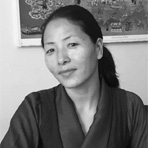
Nyima Tso
Norbulingka Institute
Nyima Tso was born in Bora village near Amdo Labrang, and has been based in India since coming into exile in 1999. She published First Journey of Life (མི་ཚེ་འདིའི་འགྲུལ་བཞུད་
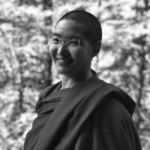
Ani Tenzin Choyang
Ani Tenzin Choyang was born in Tibet and traveled to India to study Buddhist philosophy in 2002. In 2003, she enrolled in a Nunnery where she studied for seventeen years and was recently honored with a Rapjampa degree. Over the past 17 years she has had many opportunities to study academic science through ETSI: at Emory University as a Tenzin Gyatso scholar and in summer and winter training programs in India where she also served as a translator. She is currently serving on a research internship program in Northwestern University.
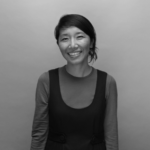
Tenzin Dickie
Buddhist Digital Resource Center (BDRC)
Tenzin Dickie is a writer and a translator. Her edited anthology Old Demons, New Deities: Twenty One Short Stories from Tibet was published by OR Books in 2017. She has been a Fulbright fellow and a fellow of the American Literary Translators’ Association, as well as an editor of the Tibetan Political Review, Tibet Web Digest and Apogee Journal. She was also formerly an editor of the Treasury of Lives. A graduate of Harvard and Columbia, she is currently communications officer at the Buddhist Digital Resource Center, managing editor of the Journal of Tibetan Literature, and interview editor of Yeshe. Her poetry was most recently anthologized in Modern English Poetry by Younger Indians published by the Indian Academy of Letters.

